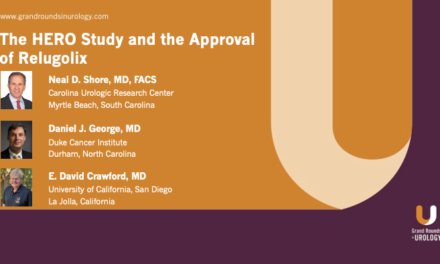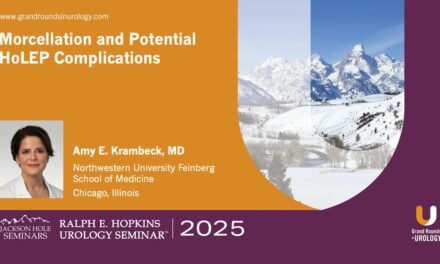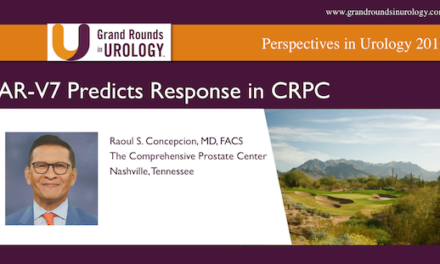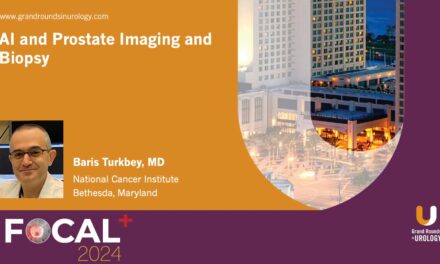Neeraj Agarwal, MD, FASCO, and E. David Crawford, MD, presented “Implications of the FDA Approval of Combination Talazoparib & Enzalutamide Therapy” for the Grand Rounds in Urology audience in July 2023.
How to cite: Agarwal, Neeraj, & Crawford, E. David. “Implications of the FDA Approval of Combination Talazoparib & Enzalutamide Therapy.” July 2023. Accessed May 2025. https://grandroundsinurology.com/implications-of-the-fda-approval-of-combination-talazoparib-enzalutamide-therapy/
Implications of the FDA Approval of Combination Talazoparib & Enzalutamide Therapy
Editor-in-Chief of Grand Rounds in Urology E. David Crawford, MD, and Neeraj Agarwal, MD, FASCO, discuss the recent FDA approval of Enzalutamide combined with Talazoparib. In this discussion, they examine a Phase 3 trial comparing Enzalutamide and Talazoparib versus Enzalutamide alone on mCRPC patients.
The results of the trial yielded significant differences in the outcomes between the Enzalutamide and Talazoparib combination arm and the Enzalutamide-Only arm. 37% decrease in the risk of progression or death was observed in the combination arm of the trial. In patient populations with tumors containing HRR mutations, the risk of progression or death was decreased by 55%.
Following its recent FDA approval, Dr. Crawford and Dr. Agarwal discuss the clinically appropriate populations for Enzalutamide and Talazoparib combination therapy, the process of diagnosis, and the limitations of the therapy. Dr. Agarwal emphasizes the necessity of germline testing in identifying predispositions to mCRPC patients and their families.
Dr. Crawford and Dr. Agarwal conclude by examining the time to PSA progression in the two trial arms. In the Enzalutamide-Only arm of the trial, average time to progression was 11 months, whereas time to progression in the Combination arm was 28 months. They recognize that the overall survival data is immature at this time, but recognize that short-term benefits of combination therapy for this patient population are significant across the board.
ABOUT THE AUTHOR
Neeraj Agarwal, MD, is Professor of Medicine and Presidential Endowed Chair of Cancer Research at the Huntsman Cancer Institute (HCI) at the University of Utah in Salt Lake City. He also directs the Genitourinary Oncology Program, and the Center of Investigational Therapeutics at HCI.
Dr. Agarwal is internationally recognized in the field of genitourinary cancers. He is the study chair of multiple Phase I/II and Phase III trials, and serves as a steering committee member of numerous other trials. He has received the SWOG Young Investigator Award, the William D. Odell Young Investigator Award, and a National Cancer Institute Cancer Clinical Investigator Team Leadership Award. After completing his medical training at the All India Institute of Medical Sciences in New Delhi, he completed a residency in internal medicine and a fellowship in geriatric medicine at the University of Iowa, followed by a hematology-oncology fellowship at HCI.
Dr. Agarwal has authored more than 300 peer-reviewed articles and book chapters. He holds numerous scientific communications leadership roles, including chief editor of the ASCO Daily News, specialty editor for ASCO’s cancer.net site, and editorial board member of several journals, including the Journal of Clinical Oncology. He also serves as a member of the ASCO Genitourinary Cancers Advisory Panel. Dr. Agarwal was recently appointed as the Senior Director for Clinical Research Innovation at the Huntsman Cancer Institute.




